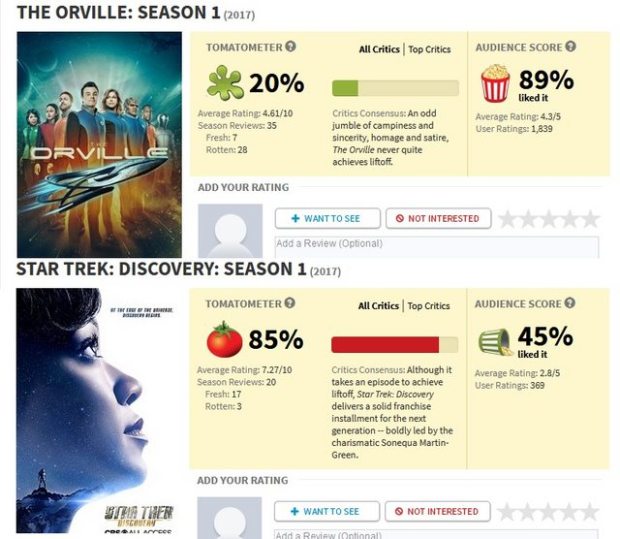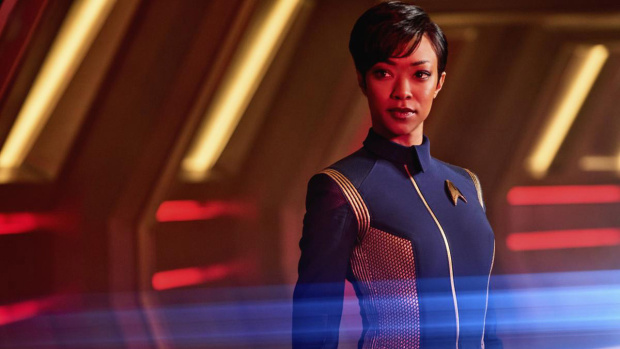
.
Viel Liebe zu den Figuren. Schnelle Dialoge. Große Fragen.
Viele (aus 700 vorigen „Star Trek“-Episoden) bekannte Situationen und Konflikte… oft überraschend drastisch und originell neu gelöst.
Ich sah Episode 1 und 2 von „Star Trek: Discovery“ (Deutsch auf Netflix), der sechsten großen „Star Trek“-Serie seit 1966… und habe Lust, mehr zu sehen: Empfehlung!
Am Dienstag, den 28. Oktober spreche ich ab 14 Uhr als Studiogast im Kulturmagazin „Kompressor“ auf Deutschlandfunk Kultur über die Serie. Schon heute, hier: mein erster Eindruck.
.
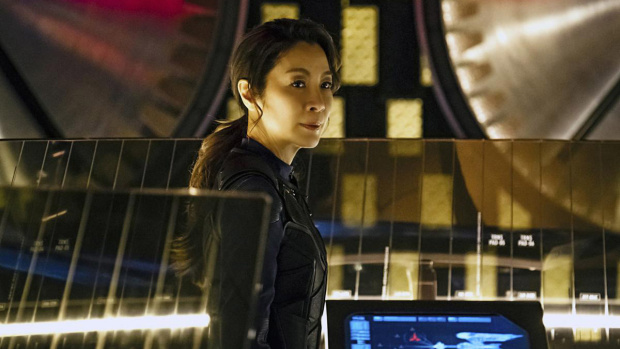
.
Mit zwölf (1995) wurde ich großer „Star Trek“-Fan: Bis ca. 1999 und dem Ende von „Deep Space Nine“ sah ich möglichst alle Episoden und Kinofilme, die damals im TV ausgestrahlt wurden, besuchte Fan-Conventions, schrieb in einem Fanzine und las jahrelang Romane, Bücher, Zeitschriften.
„Star Trek: The Next Generation“ ist die erste „erwachsene“ Serie, die ich komplett sah. Ich liebe die Figuren; und verbrachte meine Sommerferien vor der siebten Klasse mit einem Buch über logische Fehler, offene Fragen, Ungereimtheiten.
„Star Trek: Deep Space Nine“ (…und „Babylon 5“) ist mir noch heute sehr wichtig. „Voyager“ war mir oft zu bieder, und an der Kirk-Spock-Serie aus den 60ern nervte mich das Gegockel William Shatners, fehlende interessante Frauen und die meist eindimensionalen Alien-Kulturen.
Bei „Star Trek: Enterprise“ (2001) gab ich sofort nach dem Pilotfilm auf, und die drei „Star Trek“-Reboot-Kinofilme seit 2009 ignorierte ich wegen Regisseur J.J. Abrams („Alias“, „Lost“). (…wobei mich sein Star-Wars-Film 2015 dann doch überraschte und einnahm!)
Ich mag an „Star Trek“ die Politik und kulturelle Vielfalt (Bajor! Cardassia!). Die vielen Figuren und ihr oft sehr kollegiales, gutmütiges Miteinander. Die soziale Utopie der Föderation (kein Bargeld, keine Religion, wenige Vorurteile). Und ich liebe, dass zwar jederzeit die größten ethischen Fragen, die schlimmsten Kriege, Verluste und Entscheidungen, die existenziellsten Probleme auf sechs bis zwölf Figuren stürzen können… doch diese Leute trotzdem JEDE Fläche Boden ihrer Schiffe mit Teppich auslegen. Es geht um Kultur und Ideale – auch und besonders im schlimmsten Gegenwind.
.
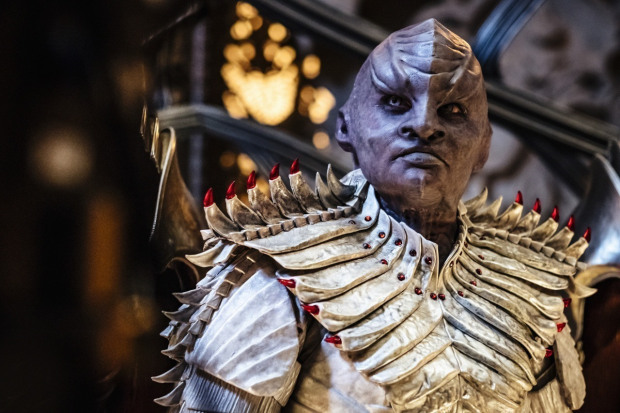
.
„Star Trek“ schafft einen Erzählraum, in dem eine aktuelle, zeitgemäße, komplex erzählte Serie viel Kluges zeigen könnte zu Kolonialismus und Utopien, Gender und Körperbildern, kultureller Vielfalt und Militär, menschlicher Leitkultur und menschlicher Selbstgerechtigkeit. „Star Trek: Discovery“ hat das Zeug, diese Serie zu sein: warmherzig, temporeich, ambitioniert.
Staffel 1 hat 15 Episoden: eine Hälfte wird noch bis Ende 2017 wöchentlich ausgestrahlt, das zweite „Kapitel“ von Staffel 1 dann ab Januar 2018. In Deutschland läuft die Serie auf Netflix, in den USA auf dem Pay-TV-Portal „CBS All Access“.
Serienschöpfer war Bryan Fuller („Pushing Daisies“, das hochgelobte „Hannibal“ mit Gillian Anderson, aktuell „American Gods“), der aber nach wenigen Monaten ausstieg.
Die Serie spielt ca. neun Jahre vor den Abenteuern von Kirk und Spock, wirkt aber viel dunkler, militärischer und… sleeker: Hologramme, Jetpacks, viele wilde Grafik-Interfaces auf dem Schiffs-Screens. Die Klingonen wurden (wie schon in den ersten Kinofilmen) noch einmal neu designt, und wirken jetzt weniger wie Russen/Wikinger als wie die plumpesten, billigsten Weltraum-Barbaren. Ein großer Schritt zurück.
Ansonsten aber wirkt die Serie – ich sah Episode 1 und 2 mit einem Freund, der noch nie „Star Trek“ sah – einladend und hochwertig, für Fans und Neueinsteiger: Hauptfigur ist eine Frau of Color, Michael Burnham, die bei Spocks Vater Sarek auf Vulkan aufwuchs und aktuell als erster Offizier auf der USS Shenzhou dient.
Das Mit- und Gegeneinander mit Captain Philippa Georgiou macht großen Spaß. Zwei (nicht-weiße, energische, unbedingt feministisch angelegte) Frauen streiten, debattieren auf einem sehr hohen Niveau. Ein schrulliges und steifes Alien, Saru, wirkt etwas einfallslos. Ab Episode 3 kommen dann noch das titelgebende Raumschiff, die USS Discovery, und ihr Captain, Gabriel Lorca (gespielt von Jascon Isaacs: Lucius Malfoy aus „Harry Potter“) hinzu.
.
.
Nach zwei Folgen bleibe ich noch etwas unsicher, weil…
…die Klingonen noch nie so eindimensional waren und ihre langweiligen Dialoge (auf Klingonisch, mit Untertiteln) viel zu viel Raum einnehmen.
…“Star Trek“ von seinen Ensembles lebt, doch Episode 1 und 2 bisher erst zwei oder drei Hauptfiguren vorstellten: Die meisten wichtigen Crewmitglieder waren bisher nicht mal zu sehen.
…vor allem aber, weil ich die beiden Frauen in der Hauptrolle sehr mochte, und noch nicht absehen kann, welchen Raum Michelle Yeoh (Captain Georgiou) einnimmt und, ob Jason Isaacs sie ab Episode 3 nicht einfach nur ersetzen wird. Das wäre zum Heulen: Warum steht Yeoh als „Special Guest Star“ im Vorspann, nicht aus Hauptdarstellerin?
.
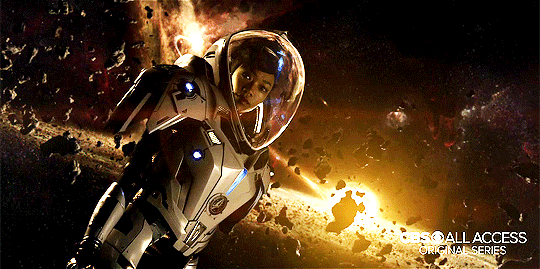
.
Fan-Kommentare und -Kritik auf Reddit:
The characters face a complex situation with no easy answers, and ending up with a worst-case scenario despite doing everything right.
After over 12 years, Star Trek is back on television.
This is a throwaway crew. We’ve only seen two of the series regulars. The real show with the USS Discovery doesn’t start until Episode 3 next week.
I’ll admit that I was expecting the Discovery to show up right towards the end of the pilot, but I was pleasantly surprised by the decision to dedicate the two-parter solely to setting events in motion and providing Burnham’s backstory, rather than the episode being a quick rush to the Discovery.
I honestly wish Star Trek would’ve found a bit more of a Master and Commander groove regarding the question of being both a vessel of discovery and a warship. M&C was the only story that ever dialed in the sweet spot between those two imperatives.
The computer’s ethical protocols deserve an episode unto themselves.
All these characters are still Starfleet, they have morality, ethics, camaraderie, a sense of adventure, but I never in my life thought I’d see anything like this for television Star Trek.
It didn’t feel like Trek at all. Or at least it didn’t feel like Trek TV – there was more of a Star Trek VI vibe. As I’ve seen some other people say, it felt more like a Mass Effect TV show with a Trek theme sprayed over it. I agree that the one part that felt very Trek was the ethics debate with the computer. I like Burnham’s character, and I don’t really have anything too bad to say about the show as a good sci-fi war movie. But I totally understand why some Trek fans don’t like it too much. War movie is not really the genre most Trekkies were looking for.
I thought the part where Burnham said, „Don’t confuse race with culture“ to be quite interesting. The Admiral had criticised her for claiming the Klingons were an aggressive species. And that has always been an inherent contradiction in the Star Trek universe;they have evolved past racism, but seem to have no problems generalising about entire races (calling the Romulans devious, the Ferengi greedy, the Klingons violent).
My theory is that the Discovery is a Section 31 black-ship whose express purpose is to find new ways to defeat threats, especially the Klingons.
.
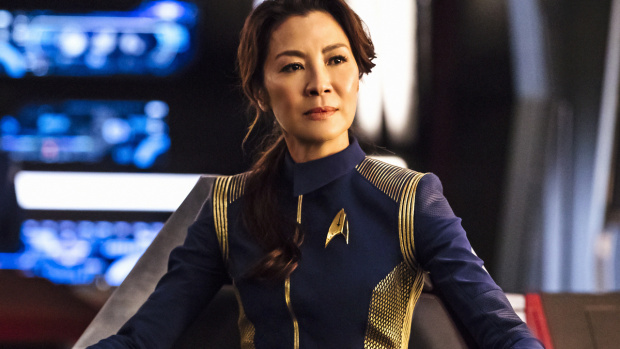
.
Kritik an den Klingonen:
Basing the new show around Klingons is exactly what Star Trek didn’t need. They should have picked up after TNG and explored the fantastical science-fiction concepts that made the shows great. The Klingon have always been a one trick pony and often part of the weaker episodes. They are too exaggerated and predictable, basically a caricature of what would happen when you’d give a medieval culture spaceships.
My only problem with them speaking Klingon is the scenes started to drag. The idea that all these great Klingon houses would just change their opinion that quickly was also hard to buy. They did seem to speak awfully slowly, even if it is mostly hard syllables. They also sound almost exactly like humans who haven’t had enough practice with fake teeth.
It’s interesting that in TOS (and thereafter) the Klingons were the Russians. Intransigent, bellicose, etc. The Federation was the US (or an idealized UN of sorts). Now, at least from the stuff you see in those first two eps, the Klingons are obsessed with not being assimilated, having their quirks erased and being homogenized into a large panculture. Where have we heard that complaint before?
T’Kuvma’s critique of the Federation’s line „we come in peace“ gave me chills! This is how Klingons should be portrayed for modern times. They see all of the moral trappings of Federation life as a propagandistic lie, and have unified their Empire (and their ideology) around the internalization of that suspicion. This is the first time in a long time that a Star Trek antagonist has been given compelling reasons for their xenophobia and hatred.
The Klingons managed to become an interstellar great power that rivaled the Federation and exceeded lesser powers like the Cardassians in terms of strength. Presumably that did take some form of internal order. I’m fine with Klingons actually being competent from time to time, as opposed to just being biker gangs in space. I know that TOS Klingons have basically been retconned completely out of existence by this point, but it is worth noting that the Klingons in TOS were pretty competent and very orderly. They were militaristic, but in a more authoritarian, orderly sense, as opposed to the testosterone-pumped warriors they became in TNG.
Alan Sepinwall: „my goodness is every single scene on T’Kuvma’s ship at last twice as long as it needs to be. As a fan of The Americans, Jane the Virgin, and other recent shows that have extended sequences in foreign languages, I’m not opposed to reading subtitles, but those shows benefit from actors who are able — through both talent and not being buried under several pounds of immobile makeup — to convey tons of emotional nuance with each line even if you have to read along with them, and they don’t turn the subtitled scenes into pure info dumps. Almost all of the Klingon stuff was literally monotonous: every line delivered in the same growl, with the same limited facial expression, reiterating the same two or three points about how much better their culture used to be.“
.

.
Kleinigkeiten/Nitpicking:
All communication in both episodes is done using holograms. Holographic communication was first established in DS9, over a hundred years later, and was clearly a new technology.
Why exactly did both the Captain and First Officer beam over to the Klingon ship with no back-up? Where is the security team? Why beam in a 12 man assault team with assault rifles, when you can beam in the two most important people on the crew with nothing but phaser pistols?
How did Michael not get suspicious when the captain had them take bizarre 290 degree turns while walking in an open desert? That scene was a level of cheesy that felt out of place with the rest of the show.
.
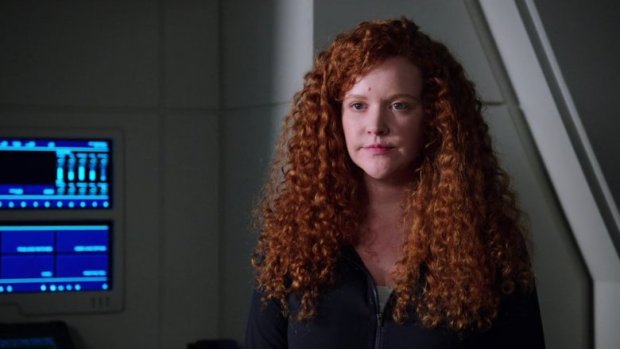
.
kurz, zu Episode 3:
- Lorcas geschädigtes Auge in Nahaufnahme wiederholt das „Auge in Nahaufnahme“-Leitmotiv aus dem Pilotfilm und dem Vorspann.
- Wie schon im Pilotfilm sagen Figuren in der deutschen ST-Synchronisation erstmals (?) „Ensign“ statt „Fähnrich“.
- ein Tribble auf Lorcas Schreibtisch!
- Pilze? Größer-und-kleiner-Werden? „Alice im Wunderland“-Motive? = „Super Mario“!
- Romulus! Der Beta-Quardant! Ich wünschte, „Trek“ würde mehr Zeit dort im Quadrant verbringen.
Reddit-Zitate zu Episode 3:
- „A ship that can transport anything anywhere. A Captain with an insane plan… and a Tribble… Discovery is actually the Klingon/Tribble war origins series.“
- Discovery has a Klingon spy
- Will Lorca’s pet tribble be the new Sisko’s baseball?
- Do you think Lorca writes fortunes for his cookies in his off time? He crafts very specific „fortunes“ for his crew the he ensures they „randomly“ receive with their dinner meals just to fuck with their heads.
- Did Saru fucking salt his tea? I thought it was sugar until I saw the matching black shaker on the table.
- Lorca also mentions Romulus. Romulus is the homeworld of the Romulan Star Empire, the other primary antagonists of TOS who are fleshed out considerably in TNG and two of the films. At this point in the chronology, no one in the Federation has ever seen a Romulan (or at least lived to tell about it), so it is unlikely anyone knows what Romulus looks like.
- „Context is for kings.“ As cheesy as it may have been, my favorite part of the episode was when Lorca breaks down the episode title for the viewers. Episodes 1 and 2 had these „title drop“ moments, too.
- Note that the Klingon-Federation border displayed here would not necessarily be the location of the Neutral Zone in postwar TOS or the TNG-era border.
- „Isn’t the site to site transport problematic for continuity?“ – „I would assume the technology will be found to be too dangerous for one reason or another.“
- „That copy of Alice in Wonderland was pretty thicc. Must have been a large font.“ – „It would probably have to be heavily annotated for 23rd century people to understand much of it.“
- I’m REALLY hoping this isn’t attempting to explain the infamous Voyager „travelling past warp 10 turns humans into giant amphibians“ episode.
- I think they’re going to stop using the magic spores when they figure out it attracts Lovecraftian terror dogs from the Warp.
- I think it’s a tardigrade, made massive by the experiment on the ship. Tardigtades can survive damn near anything. It looks like a grotesquely large one, right down to the circular mouth.
- Their research reminds me slightly of the TNG episode where they find the abandoned technology that allows for doorways to places in the universe: Iconians!
- The premiere was classic Star Trek – this was something else entirely, full of assholes, maniacs, murderers, punching, militarism, monsters aboard USS Horrorshow and her sister ship … I’m taken aback and sad.
The attentive viewer will recall that we already knew that Amanda read Carroll to Spock as a child. From TAS Once Upon A Planet:
SPOCK: The Queen of Hearts and her cards are characters from Alice Through the Looking Glass, Captain.
KIRK: I read the book as a child, Mister Spock, but I wasn’t aware you indulged in the literature of fantasy.
SPOCK: Light reading is considered relaxing, Captain. My mother was particularly fond of Lewis Carroll’s work.
.
AVClub: „While she’s crawling for her life, Michael starts reciting a bit from Alice In Wonderland. It’s utterly unexpected, and it hooked me good. The first three episodes feel cut to the bone at times, a sort of no-frills attempt to establish a serialized narrative and keep everything moving forward. So far the show has maintained its momentum, but at some point, it’s going to need to slow down a bit. That’s what moments like the Alice speech are important; these people need to be more than just moving pieces.“
AVClub: „I appreciate how immediately abrasive the new additions are. Captain Lorca is charming but untrustworthy; Tilly – a constant bundle of nervous energy – is dorky and too eager to please; and Stamets is just pissed off. That could be off-putting, but it helps to add to the sense of the Discovery as a ship where things aren’t quite right, and a crew under a lot of stress to produce. Tilly is especially interesting—I suspect her growing friendship with Michael is going to be important.„
AVClub: „“Universal law is for lackeys. Context is for kings.” -Lorca (I feel like this is going to be a crucial thematic sticking point for the show. It relates to Michael’s actions in the pilot as well as Lorca’s more questionable decisions. Trying to decide how much principle can bend in times of crisis is something Trek has dealt with before, and I’m excited to see how they deal with it again.)“
Polygon: „At some point in their different series, Kirk, Picard, Sisko and Janeway all had to wrestle with the puzzle placed before them; even choosing to make unethical and reckless decisions because they believed it to be the only option at the time. One thing that always made Star Trek stand out from the plethora of sci-fi shows and movies was its ability to make its characters feel extraordinarily ordinary in the most eventful of times. They’re human, even if the world they exist in is so fantastical and absurd that we know it couldn’t possibly be real. The stories are grounded in human decisions and the complex emotions that come along with irrationality. It’s when Star Trek is in its most frenzied state that its characters feel like people we know or imagine we could become ourselves.“
IGN: „Did Lorca let that shuttle pilot die in order to divert the prison ship at the start of the episode? If so, then we already have our answer as to his true nature.“
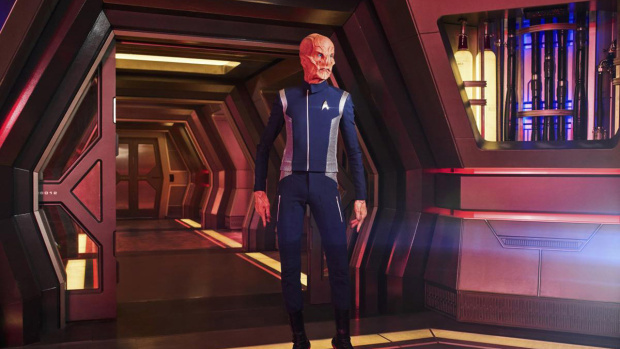
.
kurz, zu Episode 4:
- keine Nahaufnahmen von Augen erstmals; und keine Figur, die den Episodentitel laut ausspricht.
- eine weitere tote Frau (Security-Chief Landry)… und damit noch weniger weibliche Crew-Hauptfiguren.
- ein kurzer Moment mit Michelle Yeoh, für den ich dankbar bin: mehr von ihr! Wurde sie wirklich gegessen? Keine Möglichkeit, sie zu retten – zum Beispiel durch eine Zeitreise am Ende der Staffel? Und Season 2 spielt dann in einer parallelen Timeline, in der Yeoh noch lebt?
- die Klingonen-Szenen sind nach vor schleppend… aber mich freut, dass sie dieses Mal visuell VIEL interessanter ausfallen: Schwerelosigkeit! Goldene Sternkarten!
- schöne Nahaufnahme im Replikator: ich mag, wie die Serie Makro- und Mikrokosmos gegeneinander stellt und immer wieder Parallelen sucht.
- weil Bryan Fuller Halloween liebt, heißt das Schiff NCC-1031? Die Spukhaus-Momente an Bord gehen weiter.
.
Reddit-Zitate zu Episode 4:
- They ATE Georgiou!!
- I got a very „Devil in the Dark“ vibe from this episode.
- What did Lorca call the spore drive in the scene on the bridge? Displacement-Activated Spore Hub Drive: DASH Drive
- I think that they’re obviously setting up the spore-travel to require the suffering of Ripper, which is an obvious reason why the DASH drive doesn’t exist in the future.
- I must say, I didn’t like how Captain Gabriel Lorca motivated the crew: by playing shipwide the hail he got from the Federation colony. It was extremely manipulative and unnecessary. But even if I hated this, it fits and shapes Lorca’s character.
- Lorca continues to be the ends justify the means captain.
- Michael is really growing on me. Everything in her storyline related to the tardigrade was fantastic. It was great to see a character exemplifying the Starfleet ideals of reason, curiosity, and compassion. By extension, I really liked everything with Stamets who I was on the fence with prior. Lorca, while not a likable character, is shaping out to be a great one. The only thing I found myself actively disliking while watching the episode was the comically one-dimensional security officer so I was more than happy to see her go.
- I wish we could have gotten a bit more into Landry’s character. She was the only member of the crew that I truly felt had no place in Star Fleet. I was hoping that we could see why, since even Klingon nobodies no-houses are getting backstory. I imagine that she wasn’t always so cynical, and that she was hurting from a really recent loss. Rather than have time to heal over it, Lorca fed her anger and her rage, because it kept her sharp but obedient. We may have found that in some ways, Landry’s suffering was the only way she could have connected with Burnham, and it could have helped them understand one another. Instead she was just a jerk for the sake of it, who died a stupid death.
- Tasha Yar was killed defending her crew. Landry died provoking an animal into self-defense. Yar’s death was honorable, Landry’s death was deserved.
- The character who was first introduced treating human beings like savage animals ended up dying because she treated another being like a savage animal (or worse, like a tool).
- I think this is the best episode of the four so far. It clearly shows the „brains over brawn“ (aka, the death of the security officer vs. Michael figuring out the symbiosis between the tardigrade and the spores) that we’re used to seeing with Trek.
- I actually didn’t care for the hull spinning. Sure, it looks cool, but I didn’t see any practical purpose behind it. Engineering is in the part of the ship that is not the saucer, so why were parts of the saucer spinning? It looked cool; it just doesn’t make sense.
- To be fair, the only Klingons we saw until now were cult members. When Kor came over and got the crew to join him, that was our first glimpse of how normal Klingons behaved. Kor only paid lip service to T’Kuvma because he wanted the cloaking device. Once he had it, the facade was cast aside.
- I wonder what Elon Musk’s life and the nature of his business would have been like seeing as the Eugenics Wars radically shaped the politics and economics of the planet in the 1990s and then later when World War III broke out in the 2020s.
- At the end of the day, they managed to save the day for the entire colony, only at the expense of torturing one other being. In a classic episode, they’d resolve this within an hour. But from the looks of Burnham’s face, this is going to be something that is going to haunt her for a while. I’m cool with that. Most ethical dilemmas can’t be resolved in a weekly format.
.
IGN: Oh, and we finally have met Wilson Cruz as Dr. Hugh Culber, who fixes Stamets’ seriously messed up nose injury. It’s funny how Discovery is teasing out its cast so slowly, but it works (Ash Tyler, played by Shazad Latif, won’t show up until episode five next week, and he’s been pushed as a main character by CBS).
The Nerd Stash: The key part of Georgious’s message sums up a big problem with Star Trek: Discovery, “The best way to know yourself is to know others,” but we don’t know anyone yet because of how the shows been written. Now I know the reason behind the fact that we don’t really know anyone yet is because Star Trek: Discovery has only been on the air for a few episodes, but the way they’ve paced things so far necessitates that we should already know them and care for their deaths.
Syfy Wire: Tilly and Michael have a few really nice moments in this episode. I absolutely love the way their friendship is developing, a sort of parallel to the Georgiou/Michael relationship. I’d love to see more interaction between the two of them. And of course, it was lovely to see Michelle Yeoh again, even if only in holographic form. The producers have assured us we’ll see more of her in Discovery, and those scenes can’t come soon enough.
AVClub: The story about “Ripper” (real name: tardigrade) could’ve worked. Its central theme, the importance of studying and learning from the unknown rather than immediately fearing it, is at the heart of Star Trek. But the execution is lousy, full of unsubtle, clunky dialogue and forced conflict. Landry’s urgency makes no sense, nor does Michael’s desperate measures to protect something that no one seems to care that much about. The fact that her discoveries can be used to navigate the spore drive (which is a stretch) helps to tie things together, but that knowledge doesn’t happen until the last fifteen minutes or so. Before then, we have people rushing and shouting at each other solely because if they didn’t, there wouldn’t be any conflict at all.
.
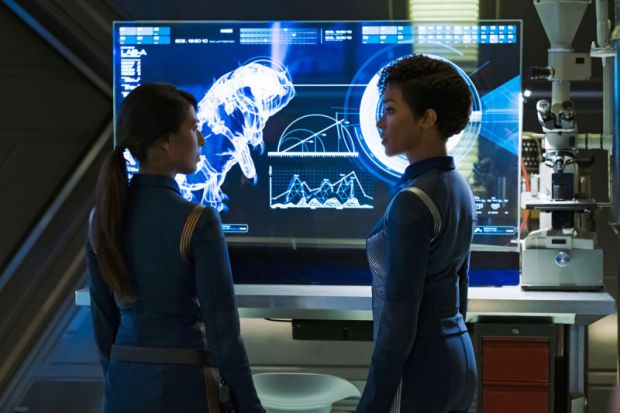
.
kurz, zu Episode 5:
- Doch wieder eine Nahaufnahme von Lorcas Auge; und ein Episodentitel, der mehrmals laut ausgesprochen und diskutiert wird.
- Ich sah die Folge, wie schon Folge 3, mit meiner Mutter. Sie hatte erneut Spaß; doch ich hatte erneut „Oh! So viel Gewalt und Horror-Aspekte? Lässt sich Mama auf sowas ein?“-Momente.
- Ich hatte vergessen, dass das „Daystrom-Institute“ eine feste Größte bei Star Trek ist… und dachte stattdessen an eine dubiose Rüstungs- oder Black-Ops-Firma.
- Die Zahnbürsten musste ich googeln.
- Ich bin großer Fan von „Willkommen im Leben“ / „My so-called Life“ mit Wilson Cruz und froh, dass seine Discovery-Rolle komplexer und größer wird.
- Ich fand die Folge solide, überzeugend. Aber hatte dieses Mal VIEL mehr Lust, User-Kommentare und -Kritiken online zu lesen: Anderen Menschen fällt oft mehr auf als mir!
.
Reddit-Zitate zu Episode 5:
- Ash Tyler? I think he’s totally a spy.
- Ash is Voq. Didn’t Ash say something about wanting to be free after everything L’Rell had put him through? We were supposed to think it was the torture, but it was actually the deklingonization.
- T’Kuvma’s rallying call was „remain Klingon“, Voq has been trying to follow that. In Ep. 4 when L’Rell offered to take him to the matriarchs he asked what it would cost and she responded „everything“. I predict a storyline exploring what it means to be Klingon, genetically and culturally.
- According to Memory alpha, the actor playing Voq is the same as Tyler, but credited under the pseudonym Javid Iqbal, a Pakastani serial killer.
- We already know that Ash’s story is a fabrication. He claims that he was taken prisoner by the Klingon captain at the Battle of the Binaries, but we know that can’t be true since the Klingon captain is L’Rell.
- When Saru meets with Ash the first time, I bet his scare tendrils will appear but Michael will be the only one to believe Saru when he says he doesn’t trust Ash.
- The notable captains? Robert April (NCC-1701’s first captain before Pike. He showed up in the the animated series), Archer, Pike, Georgiou, Matthew Decker
- It was a bit weird that every name was already familiar to us. You’d think they’d throw in a couple of previously unknowns. But then, it kinda makes sense as each show is really about the most legendary captain of their era.
- I’m glad that Stamets had a lot of character revealed before they showed that he was gay, so people can’t complain „his whole character is that he is gay“ like always.
- Culber: why have all of the major medical decisions been done through some random Lieutenant Commander doctor? He could be the head of the medical sciences department while the CMO is a regular physician. Discovery seems to have a huge science division so it would make sense if the medical department had a officer dedicated to working with them.
- I liked that they used Michael as the key element of Saru’s plot without her being the protagonist. Their interactions were almost 100% about Saru, which was what this episode needed.
- My respect for Saru initially dropped in this episode but went back up later on. I like that Saru addressed his feelings and the reasons for them, and accepted that while he was wrong he was doing what he had to do as standing captain. It’s a very adult way to process one’s own emotions and situation that is definitely befitting of a Starfleet officer.
- I didn’t believe for a second that Mudd missed his wife. His plan was probably to marry Stella, then have her dad killed, and then, eventually, Stella, and use the combination of their fortune and the re-sale of the moon to pay back his creditors.
- I can’t believe I lived to see someone say „fuck“ on Star Trek. What a time to be alive.
- I’m positive Scotty cursed so much in engineering that the warp drive was powered by it. They just couldn’t show it on TV in the late 60s.
- That ending was creepy as hell. It seems like they’re implying that, by traveling through the spore network, one can connect to the mirror universe. Did our Stamets come back, or another? Seemed like his reflection was out of time?Mirroring Stamets, but just a few seconds late.
- Theory: Spore drive technology originated from the mirror universe, as did Lorca, who may have used it to escape where he’s from. Perhaps circumstances there were far more dire, and like episode 5 said, he’s a survivor. Upon his arrival, he destroyed the USS Buran, killing all hands, including prime universe Lorca, so he could assume his identity, using a Klingon attack as a cover story. He then secretly bargained with the very top level of Starfleet to offer the technology to win the prime universe war, providing he was given unparalleled freedom to captain the Discovery. We know he’s sensitive to light, but we may not yet know the true reason why. It’s almost certainly connected to his mirror universe background. We do know that he doesn’t want doctors to examine him, probably because it would uncover his true identity. If you’re still unconvinced Lorca from the mirror universe, there’s a massive clue in his very first scene: The first thing he says – „No matter how deep in space you are, always feels like you can see home.“ He’s not gazing out into space. He’s gazing into the window’s mirrored reflection!
- Saru is going to mutiny. I don’t know how or why, I just have a hunch.
- Star Trek has dealt with rape before, but usually phenomenally poorly. See TNG’s Violations and Voyager’s Retrospect. In A Matter of Perspective it also appears that Riker raped someone. In First Contact it seems that Riker is raped. Shinzon (mentally) sexually assaults Troi in Nemesis and it is very disturbing. Tasha Yar mentioned running from rape gangs growing up. Troi was getting mind raped half the time in TNG. ENT dealt with mind raping. T’Pol from Vulcan space hippies telepathically probing her. We also know that there was some sexual assult happening during the Cardassian occupation of Bajor. Wrongs Darker than Death or Night is the DS9 episode that deals with Bajoran “comfort women”, and that episode is probably most relevant to Lt. Tyler’s situation we see in this episode.
- While the episode obviously fits into the larger Klingon war/Michael redemption arc, it also felt really self-contained. A 40-minute engagement with a tense situation and ethical dilemma. This episode was really Stamets’s, Saru’s, and Lorca’s show. It felt a lot more like other Treks where, while we have a „main character,“ any given episode might put other members of the cast into much greater focus.
- Moral / ethical dilemma, badass Captain hand to hand combat, a parable for something bigger, and a slight pushing of the social envelope on TV. That was so totally Trek and I loved it.
.
Slashfilm: The insinuation that Tyler has been raped repeatedly by the Klingon captain was so subtle in the dialogue between Tyler and Lorca that it’s easy to look past it, or even excuse it away as Tyler purposefully using his sex appeal to his advantage. But the way he swings at the Klingon captain tells a different story. He’s trying to throw back some of the pain she’s caused him.
Slashfilm: Seeing the crew abuse the tardigrade so much was quite painful. I won’t go into a “Would the original Star Trek have done this?” debate since the Discovery is a ship under duress in a myriad of ways. Honestly, it’s quite surprising and tone-deaf for the crew to not realize that this animal could have some form of sentience. Even Saru, who is prey on his planet, assumes the animal has no smarts. You’d think he of all people would understand what it’s like to be, well, preyed upon.
AV Club: The spore drive storyline moves so damn fast that it plays more like an outline than an actual plot. In three scant episodes it’s gone from “experimental” to “practical but costly” to “practical but costly in a different way.” It would be nice to have some time for any of this to sink in. Also, while I’m not asking for a lecture, a clearer understanding of just how much faster and easier the drive is to use than regular warp would be useful.
AV Club: Anyone disappointed by Star Trek: Discovery’s grim/dark view of the future past will likely leave “Choose Your Pain” still disappointed. The episode continues the trend of stark conflicts, bad vibes, and interpersonal squabbling. Even the introduction of one of the original Star Trek’s most memorably campy creations fails to lighten the mood. This might never be the sort of hopeful, life-affirming Trek so many are missing. But it has promise.
Den of Geek: The concept of „choosing your pain,“ i.e. choosing which of your cellmates will be tortured, is a good narrative device, but one that was underutilized. I didn’t care enough about any of the characters stuck in this Klingon cell for there to hold much dramatic tension. This would have been a good opportunity to nuance the Klingon culture in this show.
Den of Geek: The scene of Stamets and Culber brushing their teeth together was one of the first domestic moments (other than the adorable, hilarious Burnham/Tilly scenes) that we’ve seen on this show. I’d like to see more. I want to get a lived-in feeling from this starship. I also wouldn’t mind learning more about the relationships between the people who live there — not just romantically, but in all ways. The true heart of this show, of every Star Trek shows, lies with the story of a ship (or space station) and the chosen family who lives there. Discovery has yet to fully establish that vibe.
.
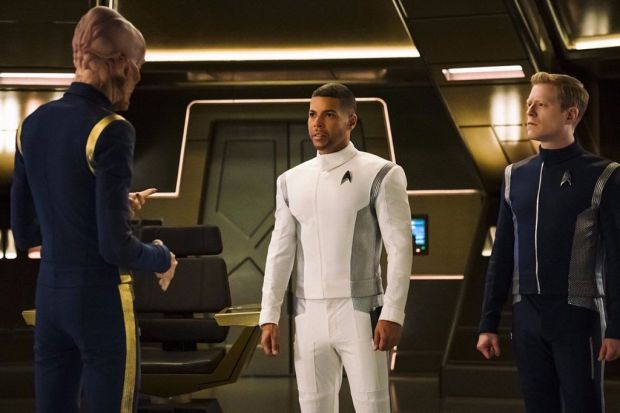
.
…und, via IMDb:
At ComicCon 2016, then-showrunner Bryan Fuller said that the inspirations for centering the show around a female lead and a character of color were the actress Nichelle Nichols (who played Lieutenant Uhura, the only black character and the only woman in the main cast of the original series) and the astronaut Mae Jemison, the first African American woman in space.
All of Bryan Fuller’s shows have at least one female character with a traditionally male name: Chuck in “Pushing Daisies“, “George in Dead Like Me“, Freddie Lounds in “Hannibal“, Michael in „Star Trek: Discovery“.
The name of Jason Isaacs’s character, Captain Lorca, is a reference to the Spanish writer and poet Federico García Lorca.
The first gay main character, Paul Stamets, is named after real-life mycologist Paul Stamets.
.
Auf Reddit kommentierten viele Nutzer (die meisten: junge weiße Männer), dass sie Hauptfigur Michael unreif, schroff, unsympathisch, unerträglich fanden, und empfahlen, lieber Episode 3 von „The Orville“ zu sehen – eine „Star Trek: The Next Generation“-Parodie von und mit „Family Guy“-Autor Seth MacFarlane. „Discovery“ hat sehr gute Kritiken, aber Netz-Jungs haben keine Lust. „The Orville“ hat vernichtende Kritiken – aber die „Family Guy“-Zielgruppe muss dort weniger starke, komplexe Frauen aushalten. Hmpf.
.
